|
IEEE
ICMA 2013 Conference
Plenary
Talk 2
"Soft robotics:" self-organization, embodiment, and biological inspiration -- the "four messages"
Rolf Pfeifer
Director
Artificial Intelligence Laboratory
Department of Informatics, University of Zurich
National Competence Center for Research in Robotics, Switzerland
Andreasstrasse 15, 8050 Zurich, Switzerland
E-mail: pfeifer@ifi.uzh.ch

Abstract:
Robotics researchers increasingly agree that ideas from biology and self
organization can strongly benefit the design of autonomous robots. Biological
organisms have evolved to perform and survive in a world characterized by rapid
changes, high uncertainty, indefinite richness, and limited availability of
information. The term "soft robotics" designates a new generation of robots
capable of functioning in the real world by capitalizing on "soft" designs at
various levels: surface (skin), movement mechanisms (muscles, tendons), and
interaction with other agents (smooth, friendly interaction). Industrial
robots, in contrast, operate in highly controlled environments with no or very
little uncertainty.
While traditionally, in robotics, artificial intelligence, and neuroscience,
there has been a focus on the study of the control or the neural system itself,
recently there has been more and more interest in the notion of embodiment. In
an embodied perspective, behavior is conceived as emergent from the interaction
of brain, body, and environment, or more generally from the relation between
physical and information (neural, control) processes. It can be shown that
through the embodied interaction with the environment information structure is
induced in the sensory data, thus facilitating categorization, perception and
learning. The patterns induced depend jointly on the morphology, the material
characteristics, the action and the environment. I will discuss the
far-reaching implications of embodiment: Because in "soft" systems part of the
functionality is in the morphology and the materials, there is no longer a
clear separation between control and the to-be-controlled, which implies that
we need to fundamentally re-think the notion of control. Although many
challenges remain, concepts from biologically inspired and soft robotics will
eventually enable researchers to engineer machines for the real world that
possess at least some of the desirable properties of biological organisms, such
as adaptivity, robustness, and versatility. These ideas will be condensed into
"four messages."
Rolf Pfeifer received his master's
degree in physics and mathematics and his Ph.D. in computer science from
the Swiss Federal Institute of Technology (ETH) in Zurich, Switzerland. He
spent three years as a post-doctoral fellow at Carnegie-Mellon University
and at Yale University in the US. Since 1987 he has been a professor of
computer science at the Department of Informatics, University of Zurich,
and director of the Artificial Intelligence Laboratory. Visiting professor
and research fellow at the Free University of Brussels, the MIT Artificial
Intelligence Laboratory in Cambridge, Mass., the Neurosciences Institute
(NSI) in San Diego, the Beijing Open Laboratory for Cognitive Science, and
the Sony Computer Science Laboratory in Paris. Elected "21st Century COE
Professor, Information Science and Technology" at the University of Tokyo
in 2004. In 2009 he was also a visiting professor at the Scuola Superiore
Sant'Anna in Pisa, at Shanghai Jiao Tong University in China, and he was
appointed "Fellow of the School of Engineering" at the University of
Tokyo. Currently, he is the Deputy Director of the NCCR Robotics, the
"National Competence Center for Research in Robotics" in Switzerland. His
research interests are in the areas of embodiment, biorobotics, artificial
evolution and morphogenesis, modular robotics, self-assembly and
educational technology. He is the author of the books "Understanding
Intelligence", MIT Press, 1999 (with C. Scheier), "How the body shapes the
way we think: a new view of intelligence," 2007 (with Josh Bongard) MIT
Press (popular science style), "Designing intelligence - why brains aren't
enough" (short version - with Josh Bongard and Don Berry, e-book), and
"La revolution de l'intelligence encorporee" ("The revolution of embodied intelligence"; with Alexandre Pitti) (in French, to appear October 2012). Lecture series: "The Shanghai Lectures", a global mixed-reality lecture series on embodied intelligence, broadcast this time from the University of Zurich, and Shanghai Jiao Tong University, China in cooperation with other universities from around the globe (fall term 2012, starting Thursday, 20 September 2012 until December 2012).
World exhibition: ROBOTS ON TOUR - World Congress and Exhibition of Robots,
Humanoids, Cyborgs, and more. 9 March 2013, Zurich (Puls 5).
|